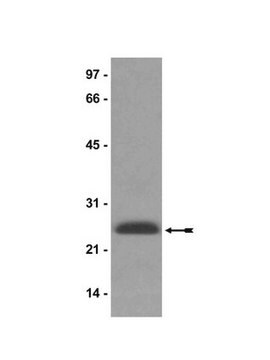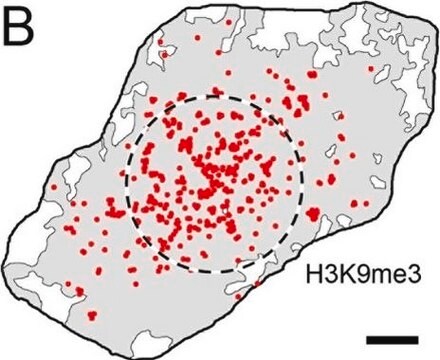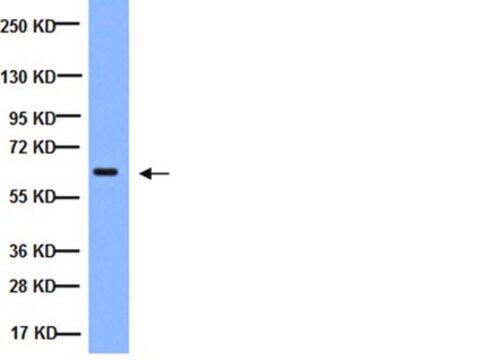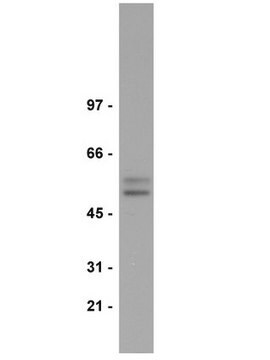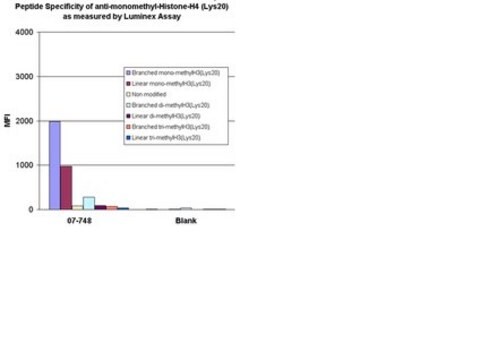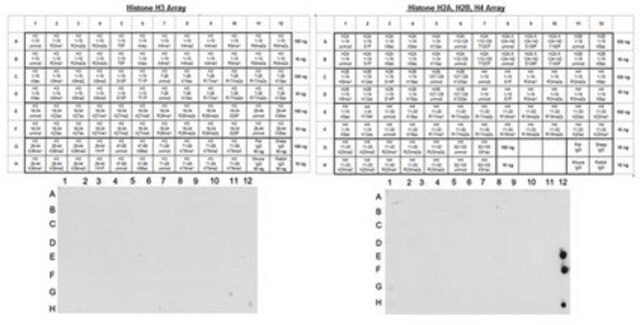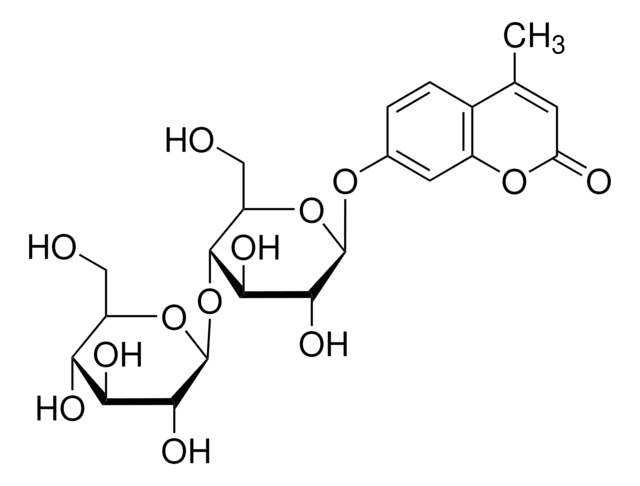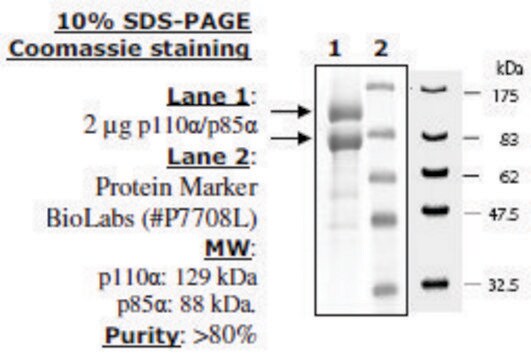おすすめの製品
由来生物
rabbit
品質水準
抗体製品の状態
affinity isolated antibody
抗体製品タイプ
primary antibodies
クローン
polyclonal
精製方法
affinity chromatography
化学種の反応性
human
テクニック
ChIP: suitable
dot blot: suitable
inhibition assay: suitable (peptide)
western blot: suitable
NCBIアクセッション番号
UniProtアクセッション番号
輸送温度
dry ice
ターゲットの翻訳後修飾
monomethylation (Lys20)
遺伝子情報
human ... H4C1(8359)
詳細
Histones are highly conserved proteins that serve as the structural scaffold for the organization of nuclear DNA into chromatin. Histones modifications regulate DNA transcription, repair, recombination, and replication. The most commonly studied modifications are acetylation, phosphorylation, methylation, and ubiquitination. These modifications can alter local chromatin architecture, or recruit trans-acting factors that recognize specific histone modifications (the "histone code" hypothesis). Methylation of histone H4 at lysine 20 has been implicated in transcriptional activation, gene silencing, heterochromatin formation, mitosis, and DNA repair. Histone H4 is progressively methylated at Lys20 during the G(2), M, and G(1) phases of the cell cycle, and methylation of H4Lys20 is a marker for heterochromatin. In mammals, the female X chromosome is coated by the Xist RNA, which is critical for silencing, and is marked mainly by methylation of H3Lys9, H3Lys27 and H4Lys20.
特異性
Based on sequence homology, broad species cross-reactivity is expected
Recognizes monomethylated Histone H4
(Lys20), Mr 11 kDa.
(Lys20), Mr 11 kDa.
アプリケーション
Anti-monomethyl Histone H4 (Lys20) Antibody is a rabbit polyclonal antibody for detection of monomethyl Histone H4 (Lys20) also known as H4K20me1, Histone H4 (mono methyl K20), H4 histone family member A & has been validated in WB.
Chromatin Immunoprecipitation:
Sonicated chromatin prepared from HeLa cells (2 X 106 cell equivalents per IP) was subjected to chromatin immunoprecipitation using 4 μg of either a negative control antibody or Anti-Monomethyl-Histone H4
(Lys20) antibody and the Magna ChIP A Kit (Cat. #17-610). Successful immunoprecipitation of monomethyl-histone H4 (Lys20)-associated DNA fragments was verified by qPCR using GAPDH coding region ChIP Primers versus Control Primers corresponding to the GAPDH promoter (Please see figures). Data is presented as percent input of each IP sample relative to input chromatin, with immunoprecipitated DNA from negative control antibody shown as (-) and monomethyl-histone H4 (Lys20) shown as (+).
Please refer to the EZ-Magna ChIP A (Cat. # 17-408) or EZ-ChIP (Cat. # 17-371) protocol for experimental details.
Dot Blot Analysis :
Absurance Histone H3 Antibody Specificity Array (Cat. No. 16-667) and Absurance Histone H2A, H2B, H4 Antibody Specificity Array (Cat. No. 16-665), which contain histone peptides with various modifications were probed with Cat. No. 07-1570 Anti-monomethyl Histone H4 (Lys20) at 1:1000 dilution. Proteins were visualized using a Donkey anti-rabbit IgG conjugated to HRP and a chemiluminescence detection system.
Peptide Blocking Assay:
40 μg of histone H4 peptide containing monomethyl lysine 20 abolished detection of histone H4 by anti-monomethyl-Histone H4 (Lys20) in immunoblot analysis of acid extracts of HeLa cells
Sonicated chromatin prepared from HeLa cells (2 X 106 cell equivalents per IP) was subjected to chromatin immunoprecipitation using 4 μg of either a negative control antibody or Anti-Monomethyl-Histone H4
(Lys20) antibody and the Magna ChIP A Kit (Cat. #17-610). Successful immunoprecipitation of monomethyl-histone H4 (Lys20)-associated DNA fragments was verified by qPCR using GAPDH coding region ChIP Primers versus Control Primers corresponding to the GAPDH promoter (Please see figures). Data is presented as percent input of each IP sample relative to input chromatin, with immunoprecipitated DNA from negative control antibody shown as (-) and monomethyl-histone H4 (Lys20) shown as (+).
Please refer to the EZ-Magna ChIP A (Cat. # 17-408) or EZ-ChIP (Cat. # 17-371) protocol for experimental details.
Dot Blot Analysis :
Absurance Histone H3 Antibody Specificity Array (Cat. No. 16-667) and Absurance Histone H2A, H2B, H4 Antibody Specificity Array (Cat. No. 16-665), which contain histone peptides with various modifications were probed with Cat. No. 07-1570 Anti-monomethyl Histone H4 (Lys20) at 1:1000 dilution. Proteins were visualized using a Donkey anti-rabbit IgG conjugated to HRP and a chemiluminescence detection system.
Peptide Blocking Assay:
40 μg of histone H4 peptide containing monomethyl lysine 20 abolished detection of histone H4 by anti-monomethyl-Histone H4 (Lys20) in immunoblot analysis of acid extracts of HeLa cells
品質
Routinely evaluated by western blot analysis
ターゲットの説明
~11 kDa
適切な製品が見つかりませんか。
製品選択ツール.をお試しください
保管分類コード
12 - Non Combustible Liquids
WGK
WGK 1
引火点(°F)
Not applicable
引火点(℃)
Not applicable
適用法令
試験研究用途を考慮した関連法令を主に挙げております。化学物質以外については、一部の情報のみ提供しています。 製品を安全かつ合法的に使用することは、使用者の義務です。最新情報により修正される場合があります。WEBの反映には時間を要することがあるため、適宜SDSをご参照ください。
Jan Code
07-1570:
試験成績書(COA)
製品のロット番号・バッチ番号を入力して、試験成績書(COA) を検索できます。ロット番号・バッチ番号は、製品ラベルに「Lot」または「Batch」に続いて記載されています。
A trans-tail histone code defined by monomethylated H4 Lys-20 and H3 Lys-9 demarcates distinct regions of silent chromatin.
Sims, Jennifer K, et al.
The Journal of Biological Chemistry, 281, 12760-12766 (2006)
James J Pesavento et al.
Molecular and cellular biology, 28(1), 468-486 (2007-10-31)
Methylation of histone H4 at lysine 20 (K20) has been implicated in transcriptional activation, gene silencing, heterochromatin formation, mitosis, and DNA repair. However, little is known about how this modification is regulated or how it contributes to these diverse processes.
Radiation-induced alterations of histone post-translational modification levels in lymphoblastoid cell lines.
Maroschik, B; Gurtler, A; Kramer, A; Ro?ler, U; Gomolka, M; Hornhardt, S; Mortl, S; Friedl, AA
Radiation Oncology (London, England) null
H Nakshatri et al.
Cell death & disease, 6, e1608-e1608 (2015-01-23)
The transcription factor nuclear factor-kappaB (NF-κB) is constitutively active in several cancers and is a target of therapeutic development. We recently developed dimethylaminoparthenolide (DMAPT), a clinical grade water-soluble analog of parthenolide, as a potent inhibitor of NF-κB and demonstrated in
ライフサイエンス、有機合成、材料科学、クロマトグラフィー、分析など、あらゆる分野の研究に経験のあるメンバーがおります。.
製品に関するお問い合わせはこちら(テクニカルサービス)